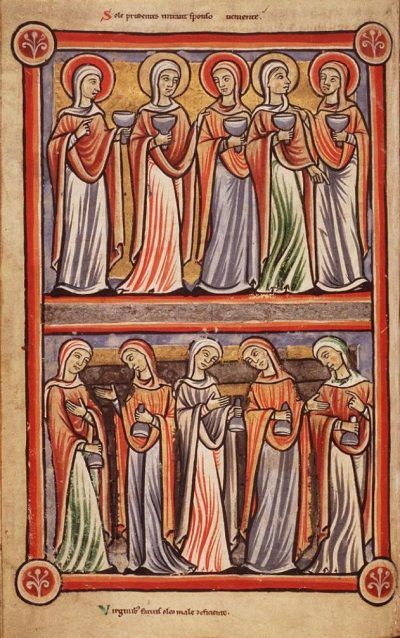 Readings:
Readings:
Wisdom 6:12–16
Psalm 63:2–8
1 Thessalonians 4:13–17
Matthew 25:1–13
According to marriage customs of Jesus’ day, a bride was first “betrothed” to her husband but continued for a time to live with her family. Then, at the appointed hour some months later, the groom would come to claim her, leading her family and bridal party to the wedding feast that would celebrate and inaugurate their new life together.
This is the background to the parable of the last judgment we hear in today’s Gospel.
In the parable’s symbolism, Jesus is the Bridegroom (see Mark 2:19). In this, He fulfills God’s ancient promise to join Himself forever to His chosen people as a husband cleaves to his bride (see Hosea 2:16–20). The virgins of the bridal party represent us, the members of the Church.
We were “betrothed” to Jesus in Baptism (see 2 Corinthians 11:2; Ephesians 5:25–27) and are called to lives of holiness and devotion until He comes again to lead us to the heavenly wedding feast at the end of time (see Revelation 19:7–9; 21:1–4).
As St. Paul warns in today’s Epistle, Jesus is coming again, though we know not the day nor the hour.
We need to keep vigil throughout the dark night of this time in which our Bridegroom seems long delayed. We need to keep our souls’ lamps filled with the oil of perseverance and desire for God— virtues that are extolled in today’s First Reading and Psalm.
We are to seek Him in love, meditating upon His kindness, calling upon His name, striving to be ever more worthy of Him, to be found without spot or blemish when He comes.
If we do this, we will be counted as wise and the oil for our lamps will not run dry (see 1 Kings 17:16). We will perceive the Bridegroom, the Wisdom of God (see Proverbs 8:12–21, 35; 9:1–6), hastening toward us, beckoning us to the table He has prepared, the rich banquet which will satisfy our souls.














